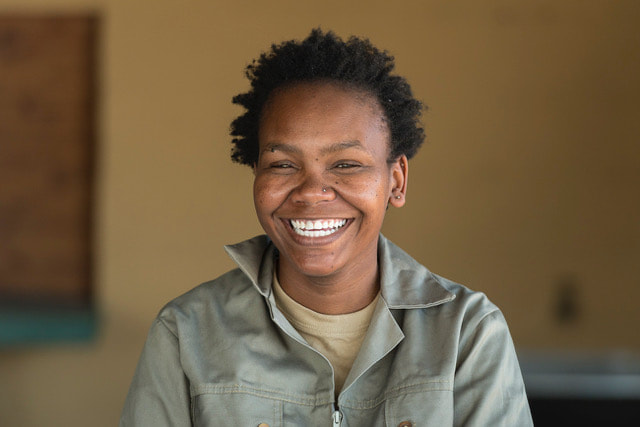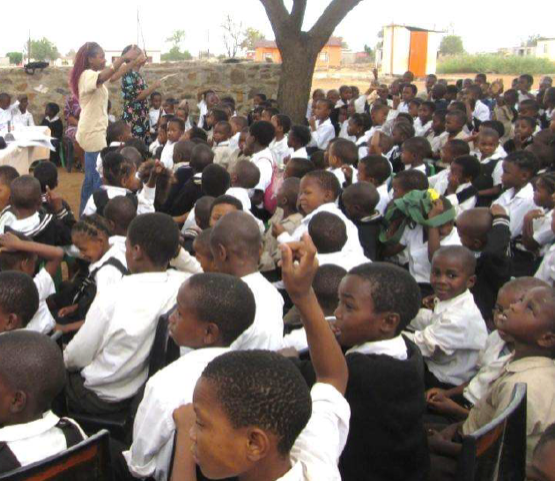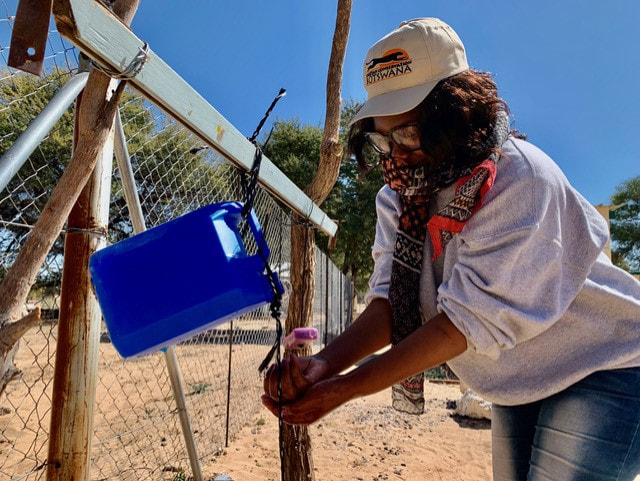Katlego K Kolanyane-Kesupile (CCB’s Public Relations and Communications Officer) caught up with Keneilwe to talk about her new role, returning to CCB, and her insights on the impact which COVID-19 is having on the work of the Communities For Conservation (C4C) team.
Katlego K Kolanyane-Kesupile: What excites you about the new role?
Keneilwe Mathaba: Working with communities to design and develop nature-based programmes for upliftment of livelihoods and environmental conservation. And, of course, continued travelling within the country as I am an outdoorsy and adventurous person.
KK: What have you missed about working with the CCB team?
KM: Nothing much! (Laughs) Just kidding. CCB comprises of a diverse team, different backgrounds across aspects -- it’s like a “soup mixture” and I love soup because you can never outgrow it. There are different flavours and aromas all the time. I like being in the midst of all this diversity, there is so much we can learn from each other; and I know they missed my smile, so I came back to brighten up all their faces. (Laughs heartily.)
KK: What are you looking to do differently to ensure the growth of the organisation and the benefits to the communities we work in?
KM: C4C is a whole new programme in the organisation which means all eyes are on me. While some of its activities are not new, I’ve put a little pressure on myself -- looking at the horizon -- to create spaces for the programme within and outside the organisation. I believe in myself and I always strive to become better at what I do; I’m also banking on the support of my team, our clients, and other stakeholders.
KM: I love my job and I’m primarily driven by passion and my desire to shape a better world, that’s why though I feel some pressure, I am not worried because I trust that in history books, this programme will be counted amongst the flourishing ones in Botswana and outside.
Personally, and professionally, I have evolved; I’m much stronger, level headed, and I have been nurtured into an amazing expert in my field and special thanks to all my mentors in the field... they are doing an amazing job raising me. I have now ‘become the brand’ and keep building my networks locally and internationally. It’s through these networks that I’m able to learn, develop and enhance my skills and knowledge, and then use these to make an impact in the lives of those surrounding me. If all the parties working together for the common good participate and are welcoming to different perspectives, nothing is impossible; but talk is cheap, we need action-oriented changes in our lives. My motto for the year 2020 has been: “Look beyond your circumstances so you can give beyond your abilities and reach beyond your borders!”
KK: That’s a great outlook. Now, you mentioned 2020, how does COVID-19 present challenges to your role and how do you intend to overcome them along with the CCB staff?
KM: Challenges are inevitable and they present obstacles that at times may seem like they won’t get better, but with time, they do. My job requires that I move around, that I talk and talk with people a lot. It requires that I explore and experience how other people in my area and in other areas (locally and internationally) are living their lives using natural resources, and how are they are conserving their environments. It requires that I learn every day and I cannot learn while in a vacuum -- I need spaces for learning. This now shows you the painful restrictions brought by COVID-19, what’s worse is that most communities I work with are not technologically equipped or resourced, so use of technology is very minimal. I’m not able to reach out to the masses as I would do without this kind of a pandemic. The communities depend largely on harvesting of natural resources, livestock rearing and arable farming as well as tourism related activities.
It's a known fact that tourism around the globe has been heavily affected. Botswana’s tourism, which is aligned with wildlife in pristine areas, is not affordable for the ordinary Motswana (Botswana citizen), and it’s upon us stakeholders in the industry to promote, extensively, the consumption of our own tourism, to create attractive and affordable packages to build our own market - not because of COVID-19, because surely it will pass, but because we need to be self-sufficient and to generate indigenous love for our different tourism attractions. We need to see the emergence of more locally-operated tourism enterprises owned by communities and individuals. Similarly, economic activities across sectors have been paralysed and returning to growth (and prosperity) levels will be a huge hassle, but it must be done with good planning.
COVID-19 is a development challenge and, like all developments, dealing with it is a process. However, each day added to our lives is an opportunity to try new things and I am learning each day that no matter how big or small the impacts are, I should keep going and utilise the available resources efficiently. We all know that NGOs are funded by local and international institutions, so COVID-19 has set the test of how each organisation will rally and manage its resources. This pandemic is a huge threat to livelihoods and governments across the whole world.
KM: What I am learning during this pandemic is that we need to be building resilient communities by tackling each season like there is a crisis of this magnitude, and that ignorance is expensive and lack of knowledge is deadly. As much as COVID-19 has affected us negatively, it has also presented opportunities. We have grown to appreciate even more what mother nature has provided us. All the developments we undertake require utilisation of natural resources and I’m hopeful that, going forward, we will all guard our natural resources and use them sustainably.
KK: It’s reassuring to hear someone in your position say this because we definitely to take on beneficial lifestyle changes for the long run. Also considering that your Masters thesis observed 'Ecotourism implications on rural livelihoods and natural resources governance in the Chobe Enclave'. What are your parting words?
KM: I am a firm believer in constant communication as it builds strong and lasting relationships among ourselves, with our clients and our stakeholders. We at CCB are not working in isolation. I’d like the community at large to know that the team is always ready to assist, to come together across departments and get the job done. We build and maintain networks because its fundamental for our work. My prayer for the whole team is that we keep developing a safe working environment, may our work be positively impactful in our communities, may we value our presence and appreciate each other’s efforts, and may we be a team that motivates each other and not compromise our physical and mental health. We all need to love what we do for us to achieve our set targets.




 RSS Feed
RSS Feed
